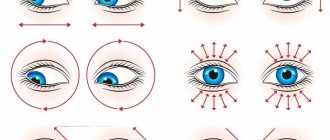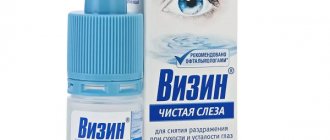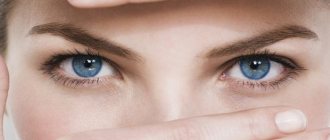How unpleasant and problematic it is when a person sees poorly. With 100% vision, you will never understand what it is like to wear glasses or contact lenses. How tired your eyes are every day, how unpleasant it is when they tell you that they saw you on the street and you didn’t say hello. But the point is that you simply don’t see well and were walking without glasses. Myopia is not only a constant problem, it is also a constantly falling vision, which means the problem is progressive. How to overcome it? Is there any way to support my vision? And will they help? vitamins to improve vision for myopia?
What kind of disease is this?
Myopia can be mild (up to -3 diopters), moderate (from -3 to -6 diopters) and high (more than -6 diopters). Myopia appears due to increased load on the visual organs during prolonged work with closely located objects, as a result of heredity, a number of past diseases, and injuries to the visual organs. Symptoms of myopia include rapid eye fatigue, blurriness of objects located at a long distance. For correction, optics, therapeutic exercises, and physiotherapy are used. Taking special vitamins is of no small importance when diagnosing myopia.
What else can you do?
In addition to eye vitamins, to improve vision in hypermetropia, ophthalmologists recommend the use of special devices that train the eye muscle and improve blood supply to the eyeball and adjacent tissues. If previously this method of vision restoration was available only in specialized eye clinics (due to the bulkiness and high cost of the devices), now, with the development of technology, almost everyone can afford to purchase such devices for use at home - the devices have become compact and easy to use. use and affordable.
Essential vitamins for myopia
The eyes experience a lot of stress every day, so they need vitamins. Without them, the organs of vision quickly get tired, vision decreases, and myopia develops.
Eye vitamins include:
- Retinol (vitamin A) . Thanks to it, a person perceives colors and images of objects. With a lack of retinol, a person begins to distinguish images and colors worse, and eye diseases such as keratoconjunctivitis and cataracts appear, which quickly become chronic. Dry eyes develop, and decreased twilight vision is observed. Red streaks appear on the sclera.
- Riboflavin (vitamin B2). Normalizes metabolic processes in the eye structures, promptly delivering nutrients there and removing decay products. Thanks to it, the restoration of pupil cells improves, the eye structures are actively supplied with oxygen. With a deficiency of B2, a person's twilight vision deteriorates, and blood vessels become weak, causing them to constantly burst, causing the sclera to turn pink. The conjunctiva and cornea are constantly inflamed, causeless lacrimation and photophobia are observed.
- Thiamine (vitamin B1) . Without thiamine, normal innervation of nerve tissue is impossible (this includes the retina). Its deficiency leads to the development of myopia, disrupting the passage of the visual signal from the brain to the organs of vision and in the reverse order. The risk of developing glaucoma and pupillary dystrophy increases several times.
- Pyridoxine (vitamin B6). Important for the normal position of the organs of vision. With its deficiency, an eye tic develops.
- Ascorbic acid (vitamin C). Protects cells of the eye structures from free radicals, maintains their integrity. Improves corneal restoration and strengthens vascular walls. With a lack of ascorbic acid, the eyes quickly get tired even after the slightest strain, and blood vessels often rupture, which is immediately noticeable by the reddish whites.
- Cyanocobalamin (vitamin B12). It is needed for the formation of full-fledged red blood cells, participates in the formation of nerve cells, and since the retina of the eyes and the optic nerve belong to the nervous tissues, cyanocobalamin helps their restoration and promotes full functioning.
If there is not enough B12, anemia develops, against the background of which the eye structures experience oxygen starvation. The eyes quickly get tired, watery, have a characteristic appearance (they become dull, the vascular network is clearly visible on the whites). - Vitamin D. Eliminates inflammation in the retina and cornea, improves eye immunity. Ensures the health of the retina and cornea of the eye, slows down aging changes in the eye structures.
- Rutin (vitamin P). Strengthens vascular walls by reducing their permeability. With a lack of rutin, the eye vessels become very fragile, which leads to constant ocular hemorrhages.
- Tocopherol (vitamin E). A strong antioxidant and collagen fiber formation accelerator. Helps strengthen cell membranes, protects eyes from ultraviolet radiation and bright artificial lighting. With its deficiency, there is a risk of developing cataracts and retinal dystrophy.
- Vitamin F. Improves the outflow of intraocular fluid and microcirculation in the tissue structures of the eye. Prevents glaucoma, quickly eliminates fatigue and spasms of the eye muscles.
The following table discusses the “eye vitamins” needed for myopia. It is indicated with which products they can be obtained.
| Name of the vitamin. | Where it is kept. |
| A (daily requirement – 2 mg). | Contained in fish oil, cod liver, and various types of cabbage. The human body itself is capable of synthesizing this vitamin from beta-carotene, which is abundant in sea buckthorn, red rowan, spinach, and carrots. |
| C (it should be taken at least 100 mg per day). | Its sources are sauerkraut, lemons and other citrus fruits, kiwi, black currants, and gooseberries. |
| B1 (thiamine). | Contained in beef, pork, chicken liver, tomatoes, oatmeal, and nuts. Daily dose 1.5 mg. |
| B2 (riboflavin). Daily dose 5 mg. | The source of this vitamin is milk and fermented milk products, egg yolk, apples, and grain products. |
| Pyridoxine (B6). The daily norm is 2 mg. | The main sources of replenishment are meat, fish, pasta, butter, milk, yeast, and sea fish. |
| AT 12. The daily norm is not less than 4 mg. | Contained in fish, liver, egg yolk, cheese. |
| Niacin (B3). The norm per day is 15 mg. | Mushrooms, peas, beans, soybeans, and meat are rich in it. |
If you have myopia, you need to include calcium in your diet, which is responsible for strengthening tissue. A large amount of calcium is found in cheese, kefir, and fermented baked milk. Its absorption requires simultaneous intake of vitamin D. For myopia, zinc (there is a lot of it in nuts, sesame seeds, fish, pumpkin) and potassium (found in celery, honey, fresh apples) are important.
Who should take eye vitamins?
1. Anyone who suffers from myopia and farsightedness should take eye vitamins.
2. For people whose age is approaching 40 years or has already “crossed” the anniversary milestone, age-related changes occur in the blood vessels of the entire body, including the eyes, during this period. After all, one of the main directions of action of eye vitamins is strengthening the vascular system.
3. Women with varicose veins, even minor ones, since these ladies constitute the “eye risk” group. The retina of the eyes is extremely susceptible to thrombosis.
4. Patients with cataracts and glaucoma. Vitamins can slow down the development of these diseases in the early stages.
5. People with diabetes, which inevitably affects the organs of vision.
All eye drops
with vitamins are used only on the recommendation of the treating ophthalmologist. Vitamin drops are most often instilled in courses; they are not recommended for constant use.
Quinax and Sancatalin drops most effectively stimulate metabolism and slow down the growth of any cataract: senile, diabetic, traumatic.
Up
Vitamins from the pharmacy
For myopia of varying degrees, vitamin therapy is an integral part of treatment. But you should know that for myopia, you need vitamins with a large amount of anthocyanins (they should be marked ISO9001).
Read in a separate article: Low myopia (stage 1): what is it, treatment for both eyes
The best eye vitamins for myopia are those that contain blueberry extract, zeaxanthin, lutein (at least one of them). These components are powerful antioxidants that help stop the progression of myopia, increasing the resistance of the eye structures to adverse environmental influences.
Effective vitamin supplements for people with myopia are:
- Doppelhertz . The drug contains lutein, ascorbic acid, retinol, tocopherol, blueberry extract, zinc, zeaxanthin, and bioflavonoids. These components restore visual acuity in myopia, while preventing retinal degeneration. Adults are recommended to take one capsule per day with food for a course of one and a half months.
- Blueberry forte. The composition contains blueberry extract, rutin, zinc, vitamins P, C, B, calcium, which normalize twilight vision and helps improve microcirculation in the retina of the eyes.
- Lutein complex. In addition to lutein, it contains carotenoids, retinol, tocopherol, and amino acids that slow down the aging of eye cells. Take 2 tablets every day (course 60 days).
- Riboflamin. Helps enrich eye tissue with oxygen, restores the functioning of eye structures.
- Quinax. Powerful antioxidant. Within a couple of weeks, patients notice an improvement in their eye condition. The downside is the need for constant use, even after achieving a good result.
- Taufon. An inexpensive but very effective drug, the main substance of which is taurine, which helps restore the functioning of eye structures.
- Prenatsid. Recommended for myopia that occurs after eye injury or surgery.
- Focus. A drug that helps stop the progression of myopia. The composition includes lycopene, zinc, lutein, blueberry extract. “Focus” relieves eye fatigue and increases visual acuity in myopia. For 3 months, take one tablet every day with food.
- Strix Forte. Product with blueberry extract, selenium, zinc, as well as additional components. The adult dose for myopia is 3-6 capsules per day.
- Vitalux plus. These vitamins contain tocopherol, zinc, copper. Available in capsules, which are taken 2 pieces per day.
Advice from ophthalmologists and recommendations for taking vitamins to improve vision
Of course, any means for both prevention and treatment should be taken only with a prescription from an ophthalmologist. Even vitamins, if used uncontrolled and incorrectly, can cause harm not only to the eyes, but to the entire body as a whole. Thus, experts talk about the negative impact on vision of excessive consumption of essential vitamin A, and a decrease in capillary tightness with the active use of vitamin C.
Remember that oversaturation with vitamin B leads to visual impairment. That is why you need to approach the purchase of vitamins with all responsibility.
Children's drugs
Myopia in children is now becoming more common due to excessive strain on the eyes.
Doctors recommend starting the prevention of myopia in children from an early age with the help of a diet that includes foods that are good for vision in myopia, which are described above, as well as vitamin complexes from pharmacies. Parents should not neglect this rule, because it is much easier to prevent myopia and cure its weak stage in childhood. The most popular children's medications that will help with myopia are:
- Visioned. The drug eliminates eye fatigue, burning sensation, and improves visual concentration.
- Polivit Baby. A children's drug that helps the formation of visual pigments (they help distinguish colors and see well at dusk). Prescribed to children diagnosed with myopia and with a genetic predisposition to it from 3 months to 3 years.
- Okovit with blueberries. A product containing a large amount of “eye” minerals, vitamins, and antioxidants. Improves the functioning of the main ocular structures. Approved for use from the age of twelve.
- Myrtilene forte. Restores vision by improving the functioning of the retina. The product is available in both capsules and drops. Recommended for use from 6 years of age.
- Vitrum Vision. This is an adult remedy that can be prescribed to adolescents over 12 years of age. It helps with myopia to relieve irritation of the conjunctiva, burning, and eye fatigue. The composition contains zinc, copper, zeaxanthin, lutein, vitamins C and E.
Proper nutrition to help stabilize and eliminate myopia
Everyone knows that carrots are the main guardian of healthy vision from an early age. However, in order for it to really bring benefits, and for beta-carotene to be properly absorbed, it is necessary to add fats to salads and carrot juices: olive, sunflower oil, mayonnaise, or better yet, sour cream.
In addition to carrots, pumpkin, spinach, zucchini, broccoli, zucchini, sweet and bitter peppers, and lettuce also contain substances that are beneficial for vision. From them, the body will receive important carotenoids - zeaxanthin and lutein, as well as other substances that nourish the eye apparatus. It is noteworthy that all these substances cannot be obtained from your own body, since it simply does not produce them.
Many people try to get all the necessary substances from freshly squeezed juices, but they should not be abused, because juices in large quantities can harm the liver. Therefore, such juices must be alternated with fresh vegetables and fruits. And it is better to get into the habit of eating at least one kilogram of various berries per season: strawberries, blueberries, currants, cherries, cherries, raspberries.
In winter, when the vegetable and fruit shelves are empty, you can start growing herbs in pots on the windowsill. This way you can grow dill, lettuce and parsley.
Of course, in winter it is most difficult to saturate your body with all the necessary substances, and even homemade greens cannot always help out. Therefore, during this difficult season, you need to replenish all reserves with the help of vitamin supplements, which must be chosen carefully and wisely.
Prevention of myopia
Vitamins are important both for the prevention of myopia and as an addition to the main therapy. But in addition to them, it is necessary to follow preventive measures that will not allow myopia to progress:
- compliance with the work and rest regime;
- eating foods that contain “eye” vitamins;
- proper organization of the workplace (good lighting, distance to the eyes from the object is at least 20 cm, from the computer monitor at least 50 cm);
- visual hygiene (do not read in moving vehicles, take breaks for therapeutic exercises while working at the computer).
Vitamin therapy to improve vision in combination with corrective optics, therapeutic and preventive measures helps stop the development of myopia and maintain sharp vision.
Author of the article: Bakhareva Elena Sergeevna, specialist for the website glazalik.ru Share your experience and opinion in the comments.
How to take eye vitamins?
Eye vitamins and eye nutritional supplements should be taken in courses: after three months of use, a month's break is required. Injected vitamins are administered intramuscularly 15 times every other day.
It is hardly fair to call vitamins for the eyes medicinal; rather, they inhibit the development of diseases
. But the preventive effect of eye vitamins is unique. In general, the eyes are sensitive to the condition of the body as a whole, and if you take multivitamins that strengthen the immune system, restore mineral deficiency and cleanse your blood vessels, then this help will not go unnoticed for the eyes.
Consultation with an ophthalmologist, other articles by the author











